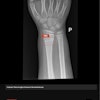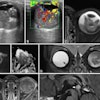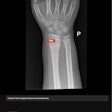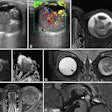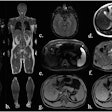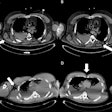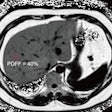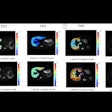
Is age just a number? Maybe, at least for predicting atherosclerotic cardiovascular disease events in older adults. Coronary artery calcium (CAC) scoring with CT is better than a patient's age for predicting risk -- particularly for coronary heart disease, according to research published online on July 26.
A multi-institutional and multinational team led by Dr. Yuichiro Yano, PhD, of Northwestern University Feinberg School of Medicine, reviewed pooled data from three large U.S. population-based studies. The group found that over 11 years of follow-up, CAC scoring had a greater association with incident coronary heart disease (CHD) than a patient's age in adults 60 and older, and it also modestly improved the prediction of incident stroke. What's more, CAC scoring was more accurate than age for classifying the risk of future events in individuals who had experienced an atherosclerotic event. The researchers found similar results when reviewing two European cohorts.
"Coronary artery calcium may be an alternative marker besides age to better discriminate between lower and higher CHD risk in older adults," the authors wrote. "Whether CAC score can assist in guiding the decision to initiate statin treatment for primary prevention in older adults requires further investigation."
An alternative marker
The researchers set out to determine whether CAC scoring could serve as an alternative marker to age in predicting atherosclerotic cardiovascular disease in older adults. They analyzed pooled data from three large U.S. population-based screening studies: the Framingham Heart Study, the Multi-Ethnic Study of Atherosclerosis, and the Cardiovascular Health Study (JAMA Cardiol, July 26, 2017).
Using the data, they compared a base risk classification model (age, sex, race/ethnicity, study site, current smoking status, systolic blood pressure, total cholesterol, high-density lipoprotein cholesterol, diabetes, and the use of antihypertensive lipid drugs and lipid-lowering drugs) with a model that removed patient age and added CAC scoring. Afterward, they compared the results with two European cohorts -- the Rotterdam Study and the Heinz Nixdorf Recall Study.
The U.S. cohorts included 4,778 participants with a mean age of 70.1 years. Of these subjects, 2,582 (54%) were women and 2,431 (50.9%) were nonwhite. There were 405 CHD and 228 stroke events over the 11 years of follow-up. After performing Cox regression analysis and utilizing confidence statistics (C-statistics) to indicate the probability of predicting a particular event, the researchers found that CAC scores (C-statistic, 0.733) had a greater association than age (C-statistic, 0.690) with incident CHD and also modestly improved the prediction of stroke (0.690 vs. 0.670).
CAC scores also improved the performance of a base risk classification model, according to the researchers.
| Performance in predicting atherosclerotic cardiovascular event | ||
| Base risk classification model | Base risk classification model with addition of CAC scores and without patient age | |
| Stroke | 0.717 | 0.733 |
| CHD event | 0.703 | 0.735 |
| All atherosclerotic cardiovascular events | 0.699 | 0.725 |
Superior performance
In other findings, the researchers reported that 1,478 patients had a CAC score of 0; these participants had more than 90% probability of not having an atherosclerotic cardiovascular disease event. The group also concluded that CAC score outperformed age for reclassifying risk in patients who had experienced incident atherosclerotic cardiovascular disease.
The superior performance of CAC score for predicting CHD events was also confirmed in the two European cohorts totaling 4,990 participants, according to the researchers.
"In older adults without known cardiovascular disease, individual CAC score instead of chronological age provided better discrimination for incident [atherosclerotic cardiovascular disease] (CHD in particular) over an 11-year follow-up," they wrote. "Besides age, CAC may be an alternative marker to better discriminate between lower and higher CHD risk in older adults."
Given the lack of clear agreement on risk thresholds to initiate statins for primary prevention of atherosclerotic cardiovascular disease in older adults, clinical judgment and patient input are critical components during the decision-making process, the researchers noted.
"Coronary artery calcium score may assist in such a shared decision-making approach," they wrote. "Clinical trials are needed to assess whether CAC score can help refine treatment decisions and subsequently reduce unnecessary medical expenditure and adverse effects of statins and increase treatment efficiency in older adults."

